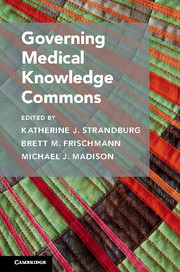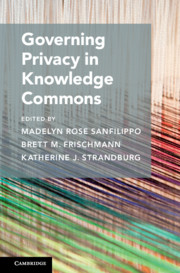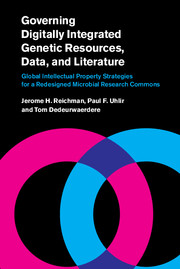Governing Medical Knowledge Commons
£76.00
Part of Cambridge Studies on Governing Knowledge Commons
- Editors:
- Katherine J. Strandburg, New York University School of Law
- Brett M. Frischmann, Villanova University, Pennsylvania
- Michael J. Madison, University of Pittsburgh School of Law
- Date Published: October 2017
- availability: Available
- format: Hardback
- isbn: 9781107146877
£
76.00
Hardback
Other available formats:
Paperback, eBook
Looking for an inspection copy?
This title is not currently available on inspection
-
Governing Medical Knowledge Commons makes three claims: first, evidence matters to innovation policymaking; second, evidence shows that self-governing knowledge commons support effective innovation without prioritizing traditional intellectual property rights; and third, knowledge commons can succeed in the critical fields of medicine and health. The editors' knowledge commons framework adapts Elinor Ostrom's groundbreaking research on natural resource commons to the distinctive attributes of knowledge and information, providing a systematic means for accumulating evidence about how knowledge commons succeed. The editors' previous volume, Governing Knowledge Commons, demonstrated the framework's power through case studies in a diverse range of areas. Governing Medical Knowledge Commons provides fifteen new case studies of knowledge commons in which researchers, medical professionals, and patients generate, improve, and share innovations, offering readers a practical introduction to the knowledge commons framework and a synthesis of conclusions and lessons. The book is also available as Open Access.
Read more- Collects fifteen new case studies of collaborative knowledge and information production in medicine and health sciences research and innovation
- Restates the updated knowledge commons research framework in accessible terms for ease of reference by readers and future researchers in multiple disciplines
- This book is also available as Open Access
Reviews & endorsements
'Governing Medical Knowledge Commons is a very interesting and useful book, and I am delighted to say so! Innovation development is increasingly becoming open and distributed over time. Whether and how the fruits of this openly revealed activity can be collected and efficiently utilized as a commons is a very important next question. Strandburg, Frischmann, and Madison greatly help further progress via this collection of very thoughtful studies on pioneering medical commons models and trials.' Eric von Hippel, T. Wilson Professor in Management, Sloan School of Management, Massachusetts Institute of Technology
See more reviews'This volume builds on Elinor Ostrom's research on the commons. Understanding the institutions that promote cooperation is critical to good governance and improving social welfare. The authors in this volume provide case studies of governance in the medical commons. The insights are pathbreaking and will lead to better policies for medical research. Moreover, the insights here will be synergistic to research in other areas of governance of commons.' Lee J. Alston, Director of the Ostrom Workshop, Indiana University, Bloomington
'This book makes significant advances on a decades-long research agenda through which Elinor Ostrom and other commons researchers uncovered the reasons behind the often surprising success of community-based management of natural resources. Contributors to this volume demonstrate that their concept of 'commons as a mode of governance' goes well beyond standard protections for intellectual property rights to integrate collaborative practice into the very heart of innovation in medical research and treatment. Case studies detail several impressive and diverse examples of this powerful synthesis of research and practice, and the editors conclude with practical lessons for how we might achieve comparable levels of improvement in other areas.' Michael D. McGinnis, Associate Dean, College of Arts and Sciences, and former Director, Ostrom Workshop, Indiana University, Bloomington
Customer reviews
Not yet reviewed
Be the first to review
Review was not posted due to profanity
×Product details
- Date Published: October 2017
- format: Hardback
- isbn: 9781107146877
- length: 436 pages
- dimensions: 237 x 158 x 30 mm
- weight: 0.78kg
- contains: 38 b/w illus. 14 tables
- availability: Available
Table of Contents
1. The knowledge commons framework Brett Frischmann, Michael Madison and Katherine Strandburg
2. Leviathan in the commons: biomedical data and the state Jorge Contreras
3. Centralization, fragmentation, and replication in the genomic data commons Peter Lee
4. Genomic data commons Barbara J. Evans
5. Population biobanks' governance: a case study of knowledge commons Andrea Boggio
6. The Sentinel Initiative as a knowledge commons Ryan Abbott
7. Cancer: from a kingdom to a commons Michael Mattioli
8. The greatest generational impact: the open neuroscience movement as an emerging knowledge commons Maja Larson and Margaret Chon
9. Better to give than to receive: an uncommon commons in synthetic biology Andrew W. Torrance
10. Governance of biomedical research commons to advance clinical translation: lessons from the mouse model community Tania Bubela, Rhiannon Adams, Shubha Chandrasekharan, Amrita Mishra and Songyan Liu
11. Constructing interdisciplinary collaboration: the Oncofertility Consortium as an emerging knowledge commons Laura G. Pedraza-Fariña
12. The application of user innovation and knowledge commons governance to mental health intervention Glenn Saxe and Mary Acri
13. Challenges and opportunities in developing and sharing solutions by patients and caregivers: the story of a knowledge commons for the patient innovation project Pedro Oliveira, Leid Zejnilović and Helena Canhão
14. Chronic disease, new thinking and outlaw innovation: patients on the edge in the knowledge commons Stephen Flowers
15. The North American Mitochondrial Disease Consortium: a developing knowledge commons Katherine J. Strandburg and Brett M. Frischmann
16. The Consortium of Eosinophilic Gastrointestinal Disease Researchers (CEGIR): an emerging knowledge commons Katherine J. Strandburg and Stefan Bechtold.
Sorry, this resource is locked
Please register or sign in to request access. If you are having problems accessing these resources please email [email protected]
Register Sign in» Proceed
You are now leaving the Cambridge University Press website. Your eBook purchase and download will be completed by our partner www.ebooks.com. Please see the permission section of the www.ebooks.com catalogue page for details of the print & copy limits on our eBooks.
Continue ×Are you sure you want to delete your account?
This cannot be undone.
Thank you for your feedback which will help us improve our service.
If you requested a response, we will make sure to get back to you shortly.
×






